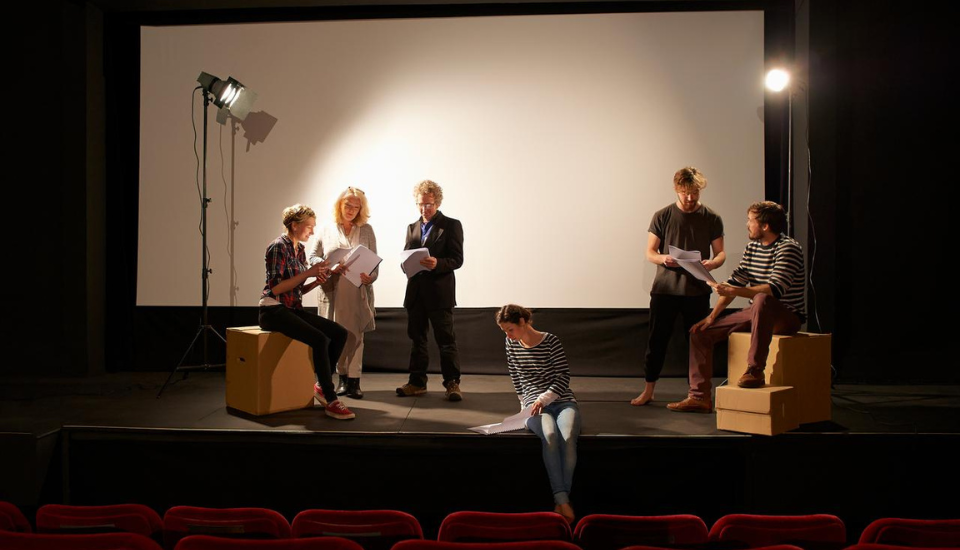RSA Chief Executive Andy Haldane and Tracy Brabin, Mayor of West Yorkshire, discuss how investing in culture and creative industries can make a success of local growth and levelling up.
An edited version of this joint column by Andy Haldane, Chief Executive of the RSA, and Tracy Brabin, Mayor of West Yorkshire, was originally published in The Yorkshire Post on Friday 15 July 2022. It has been reproduced here with their kind permission.
Standing proudly in the centre of Bradford is the City Hall, a glorious 19th-century building. Its magnificent clock tower was inspired by the Palazzo Vecchio in Florence, once home to the Medicis, who laid the ground for the renaissance in 15th century Italy.
In the 2020s, West Yorkshire is again looking for inspiration from the Medici era to drive forward our own renaissance. As in 15th century Italy, culture should be at the core of our plans to build a strong, inclusive economy, one that will benefit not just West Yorkshire but the whole of the North and beyond.
We’re living through a unique moment in our history. A moment that demands bold leadership and decisive action if we are to flourish as individuals, regions and nations in the face of Covid and the cost of living crisis. A moment to test the theory that if you invest in culture and the creative industries, you can make a success of local growth and levelling up. A moment to prove that culture works for everyone, creating jobs and skills, health and happiness from early years to old age.
Greater Manchester and the West Midlands have been chosen by the government as trailblazers for innovation and devolution. We in the heart of the North have a once-in-a-lifetime opportunity to blaze a trail when it comes to culture and the creative sector.
The evidence, historically and internationally, clearly shows that local success comes from having a rich array of raw ingredients. These include strong civic institutions which can serve as an anchor for action; strong social capital built on relationships, trust and pride in place; and strong cultural capital with vibrant social infrastructure – from football clubs to theatres, cinemas to parks, music venues to libraries.
Levelling up: foundations of a renaissance
These themes were central to the government’s Levelling Up White Paper published earlier this year. And these same raw ingredients are ones in which West Yorkshire has a rich heritage and has been investing heavily over recent years. These foundations now place the region on the cusp of an economic and cultural renaissance.
As a Mayor with three decades of experience as an actor and writer, with a passion for providing culture to all, and as one of the authors of the government’s Levelling Up White Paper and now Chief Executive of the Royal Society of Arts, we are now working in partnership to deliver this renaissance for the region and the nation.
Culture and creativity have long been central to our region’s history, from the Brontes to J B Priestley, from David Hockney to Zayn Malik. But the promise of the coming years suggests an even more exciting future. Channel 4 has relocated to Leeds and is already having a positive impact on the local talent and production ecosystem.
Meanwhile, the next three years in West Yorkshire will be a heady mix of yearlong festivals, from Leeds 2023 to Kirklees Year of Music to Year of Culture in Wakefield and Calderdale in 2024. This will culminate in Bradford as the UK’s new City of Culture in 2025.
Together, these celebrations will provide the spark for what should be a long-lived cultural and creative revolution in the region. They will create just the opportunity needed for investment, regeneration and job creation. This is the opportunity to leave a lasting economic legacy, level up our region and drive it forward into the mid-century.

Innovation and progress from creativity
The benefits of this cultural investment are not just financial. Investment in culture also boosts people’s pride in their community, their sense of local belonging, and their hopes for the future. We know that cultural activities make us happy and healthy, keep us active, bring us together and boost our sense of confidence in ourselves.
As we discussed at the Bradford Literature Festival last month – another jewel in West Yorkshire’s cultural crown - we know that the intersection of different cultures and disciplines offers the deepest wellspring of creativity, setting forth a virtuous circle of innovation and progress. This virtuous circle is now in motion in the region and will be given momentum by upcoming events.
Culture is also a magnetic attractor, drawing in the talented people, the innovative businesses and the patient capital needed to make Medici magic. Creative people are attracted to creative places, boosting innovation and attracting even more creative people. We see this now happening right across the region, with cultural hotspots from Leeds and Bradford to Howarth and Hebden Bridge.
This magnetic attraction of people, commerce and finance are what economists call agglomeration. And it is the key to success in cities and regions. Culture provides the crucible in which this cumulative process of growth can be fired.
But if culture is a magnet, it has two poles. Just as a thriving cultural scene attracts talented creative people, the absence of such a scene repels creative people. No one wants to live in a place where there is nothing to do after 6 pm. West Yorkshire still has its share of cultural cold spots in need of investment.
Cultural events and institutions as a strategy
When it comes to local growth, then, the creative sector is both an essential ingredient of success and has the fertile soil necessary for success. That’s why in West Yorkshire we’re committed to harnessing the power of our cultural events and institutions into a single, strategic plan for the region. A plan that can build on the strengths of our cultural hotspots, while creating new creative clusters in the cold spots.
Working in partnership, we have grand plans and ambitions for our region. But there is still plenty more to do if we are to make good on this vision and unleash our full creative potential. That means better data, better evidence and further devolution from Whitehall and Westminster to allow plans to be designed and delivered locally. It may also need us to think imaginatively about what is needed to drive transformative change.
A generation ago, Atlanta was not known for its film industry. Today, it has more sets and produces more films than Hollywood or indeed anywhere else in the World. Tax breaks were a crucial ingredient of Atlanta’s success story and have now more than paid for themselves.
There may be lessons here for the UK. Imagine creating a cultural, rather than maritime, “freeport” to catalyse change and increase the magnetic attraction of the region? Of course, these are potentially large fiscal steps at a time of tight budgets. But if ever there were a time for thinking big and bold, it is now.
As with any economic plan, investment in R&D and skills will be key, as will attracting overseas investment. We’ll need to support and grow our local SMEs and freelancers, vital as they are to the creative industries’ supply chains and innovations. And we’ll need to ensure we have the 21st-century transport and digital infrastructure necessary to nourish our ambitions.
We are ready to seize this unique moment, alongside partners and institutions, providing the creative crucible necessary to spark a 21st-century renaissance. We want to make life more prosperous, meaningful and enjoyable for all of the 2.3 million people who call West Yorkshire home.
How can investment in culture and creativity benefit this and any local economy? What will levelling up look like with a focus on these industries? Let us know in the comments below.
Related articles
-
RSA CEO Andy Haldane speaks at the Bradford Literature Festival
Fellowship news
RSA chief exec Andy Haldane gave the inaugural Bradford Literature Festival Culture Sector Lecture at the University of Bradford on Friday 24 June 2022.
-
A chance to be inspired by creative talent in Scotland
Fellowship news
A wonderful opportunity to celebrate emerging creative talent in Scotland, and to enjoy some unique and though-provoking work.
-
Working partners
Comment
Jamie Cooke
A Fellow-led project, bringing together Fellows in Scotland and the US is seeking to bring new ideas for the future of work to Inverclyde, a proud post-industrial area outside Glasgow.





Be the first to write a comment
Comments
Please login to post a comment or reply
Don't have an account? Click here to register.